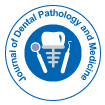Dental Corono-Radicular Fractures in Adult Subjects: Epidemiology, Etiopathogeny, Anatomic Pathology and Therapeutic Indications
Received Date: Nov 26, 2021 / Accepted Date: Feb 21, 2022 / Published Date: Feb 22, 2022
Abstract
Coronoradicular fractures are a frequent reason for consultation today in Ivory Coast and they pose the problem of the conservation of the tooth, yet awaiting a final or prosthetic restoration.
Methods: It is a descriptive cross-sectional study performed on 100 cases of corono-root fractures in adult patients received during our consultations.
Thus, for each patient, note the reason for the consultation, the tooth concerned, living or not, with ductal treatment or not, with a filling or not, the type of fracture, the mobile buccal, palatal or lingual pan and the presence adjacent or opposing teeth.
Results: Epidemiologically, a frequency of 9% coronavicular fractures diagnosed during our consultations. Mastication is the main cause of occurrence and in 70% of cases and the gingival pain caused by mobility fracture pan 80% or pulpal exposure 10% motivates the consultation.
The teeth were depulped in 85% of cases and the opposing tooth exists in all cases and often alive.
60% of oblique fractures are sub-gingival, 40% supra-gingival, and the mobile part is most often vestibular 70% when the tooth is maxillary and 60% lingual when the tooth is mandibular and the maxillary teeth are most represented in our sample 60%.
Conclusion: Coronary root fractures are quite worrying for the practitioner because of their frequency and their etiopathogenesis. They are usually treated teeth or at the end of treatment with a prosthetic or non-prosthetic project.
These coronal oblique oblique fractures raise the question of the conservation or not of the tooth. This will depend on the type of fracture and the height of the fracture, especially at the root level.
Citation: Attogbain KP, Adou Akpe J, Amantchi D, Aka A (2022) Dental Corono- Radicular Fractures in Adult Subjects: Epidemiology, Etiopathogeny, Anatomic Pathology and Therapeutic Indications. J Diabetes Clin Prac 6: 114. Doi: 10.4172/jdpm.1000114
Copyright: © 2022 Attogbain KP, et al. This is an open-access article distributed under the terms of the Creative Commons Attribution License, which permits unrestricted use, distribution, and reproduction in any medium, provided the original author and source are credited.
Select your language of interest to view the total content in your interested language
Share This Article
Recommended Journals
Open Access Journals
Article Tools
Article Usage
- Total views: 2832
- [From(publication date): 0-2022 - Nov 28, 2025]
- Breakdown by view type
- HTML page views: 2162
- PDF downloads: 670
